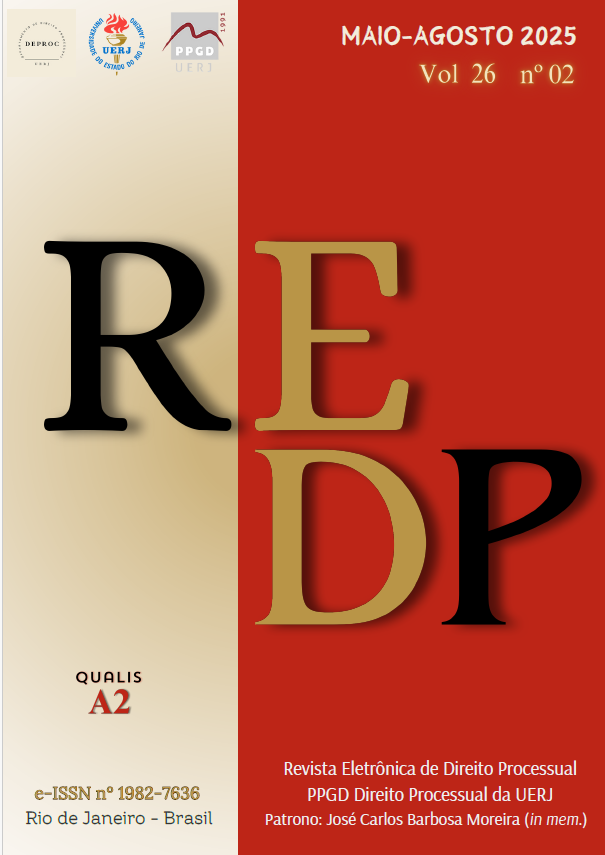POR UMA TEORIA DA DECISÃO EM PERSPECTIVA GARANTISTA
DOI:
https://doi.org/10.12957/redp.2025.87078Resumo
Diante das reformas da legislação processual em busca do reforço de garantias processuais de natureza constitucional, certamente realizadas para a concretização do devido processo legal, percebe-se que todos os atos procedimentais precisam estar adequados a tal realidade e, especialmente, a decisão proveniente do debate entre os sujeitos processuais, razão da relevância de refletir criticamente sobre qual suporte teórico há de ampará-la. Neste sentido, o presente estudo busca desenvolver discussões que permeiam as bases de uma teoria de decisão judicial sob a óptica garantista. Para tanto, serão analisadas duas dimensões importantes e que fazem parte do constitucionalismo contemporâneo, a primeira no plano substancial – o constitucionalismo garantista – e a segunda no plano procedimental – o garantismo processual. Ambas apresentam como característica comum a estrutura de contenção de arbítrios estatais, especialmente a contenção do arbítrio judicial, permitindo a construção de uma teoria de decisão mais alinhada aos modelos de Estado Democrático de Direito. As reflexões realizadas a partir da pesquisa permitiram inferir que, no contexto da teorização da decisão judicial nos Estados Contemporâneos, a única que parece ser capaz de conter o arbítrio estatal seria a permeada pelo garantismo, todavia, a assunção das duas dimensões do garantismo, constitucionalismo garantista e o garantismo processual, não são capazes por si só de coibir o arbítrio configurado pela discricionariedade judicial, mas permitem um maior controle dos atos praticados pelos magistrados e detém potencial limitador de comportamento voluntarista. A estrutura normativa infraconstitucional e respectiva aplicação, a despeito da indicação expressa de ordenação, disciplina e interpretação em obediência às normas fundamentais da Constituição, direcionam o comportamento decisório e desenham uma teoria da decisão incapaz de impedir atuações discricionárias, ainda que possam servir de balizadores para o aprimoramento do conteúdo da decisão. A pesquisa se desenvolveu pelo método dedutivo, parcialmente exploratória, com levantamento bibliográfico e documental, investigação analítico-legislativa de âmbito nacional e estrangeiro, principalmente utilizando o marco teórico Principia Iuris de Luigi Ferrajoli, além da legislação processual brasileira, sobretudo o Código de Processo Civil.
Downloads
Publicado
Como Citar
Edição
Seção
Licença
Copyright (c) 2025 Lilia Nunes Silva, Marcelo Pereira de Almeida

Este trabalho está licenciado sob uma licença Creative Commons Attribution 4.0 International License.
Todos os artigos publicados na Revista Eletrônica de Direito Processual (REDP) (Departamento de Direito Processual, Universidade do Estado do Rio de Janeiro, Brasil) são licenciados por meio de uma Licença Creative Commons - Atribuição 4.0 Internacional (CC BY 4.0).
Os autores retêm os direitos autorais de seu artigo e concordam em licenciar seu trabalho com a licença CC BY 4.0, aceitando assim os termos e condições específicos desta licença disponíveis no seguinte website: https://creativecommons.org/licenses/by/4.0/legalcode.
- Os autores concedem à REDP o direito de primeira publicação, de se identificar como publicadora original do trabalho e concedem à revista uma licença de direitos não exclusivos para utilizar o trabalho das seguintes formas: Reproduzir, vender e distribuir cópias eletrônicas ou impressas do manuscrito como um todo, de partes específicas do manuscrito e de suas traduções para qualquer idioma;
- O uso do artigo por terceiros é livre, contanto que a integridade da publicação seja mantida e seus autores originais, periódico de primeira publicação e detalhes de citação sejam identificados.
Dentro dos termos da licença, os autores podem entrar em acordos contratuais adicionais separados para a distribuição não exclusiva da versão publicada do trabalho na revista.
Copyright and Licensing
All articles published in the Procedural Law Electronic Review (REDP) (Department of Procedural Law, State University of Rio de Janeiro, Brazil) are licensed under a Creative Commons License - Attribution 4.0 International (CC BY 4.0).
- Authors retain copyright to their article and agree to license their work under the CC BY 4.0 license, thereby accepting the specific terms and conditions of this license available at the following website: https://creativecommons.org/licenses/by/4.0/ legal code.
- Authors grant REDP the right of first publication, to identify itself as the original publisher of the work, and grant the journal a non-exclusive license to use the work in the following ways: Reproduce, sell and distribute electronic or printed copies of the manuscript as a whole, of specific parts of the manuscript and its translations into any language;
- Use of the article by third parties is free, as long as the integrity of the publication is maintained and its original authors, first publication journal, and citation details are identified.
Within the terms of the license, authors may enter into separate additional contractual agreements for the non-exclusive distribution of the published version of the work in the journal.




